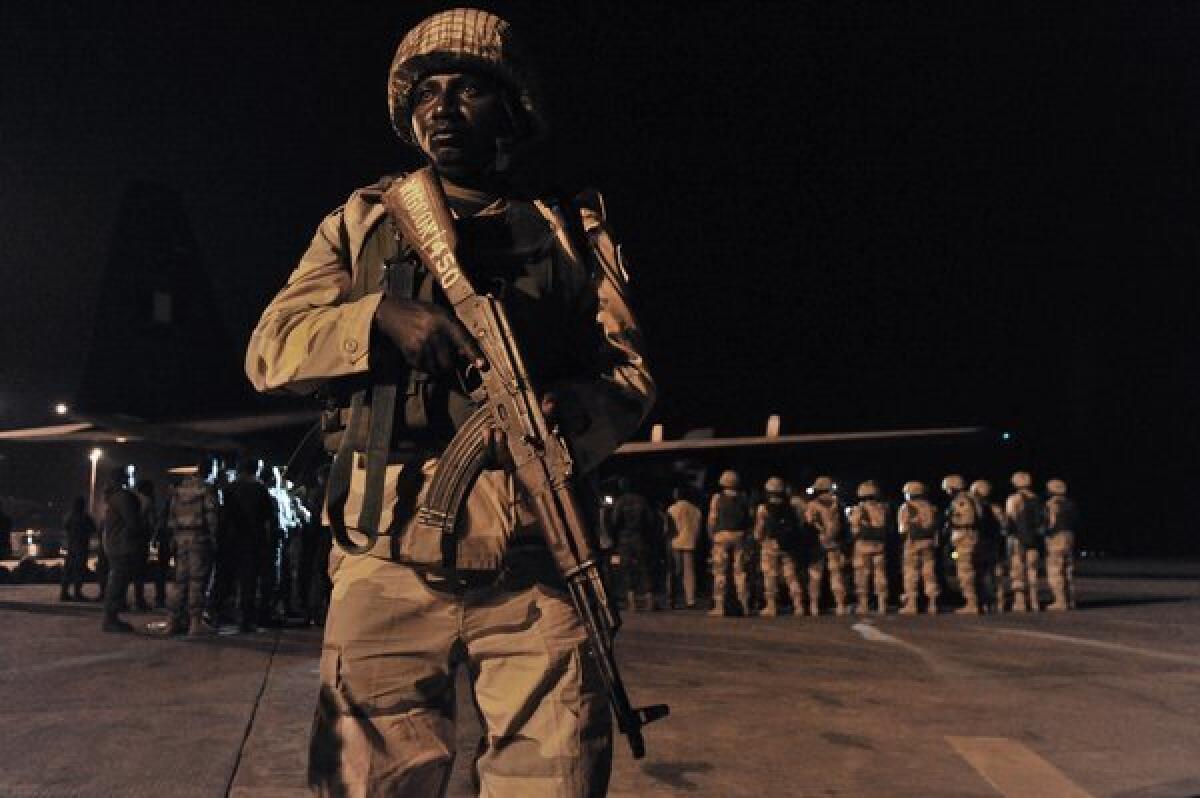In Africa, resilient Al Qaeda flaunts power to terrorize

A deadly hostage-taking at an Algerian gas complex and an armed international confrontation in Mali herald the opening of another front in the global war on terrorism and serve as stark reminders that Al Qaeda retains the power to inflict death and disorder despite the loss of its leader.
Battered but unbroken, the militant Islamist network founded by Osama bin Laden has mutated into regional factions since his 2011 killing and earlier setbacks in Iraq and Afghanistan that forced extremist remnants to migrate to countries like Yemen, Syria and Mali. There, in the ungovernable mountains, desert and war zones, they have established new bases and conscripted local foot soldiers to their radical cause.
This week’s seizure of the Algerian gas facility and dozens of foreign workers, including Americans, is described by counter-terrorism experts as an elaborately scripted operation that speaks to a resilient and adaptive Al Qaeda. They dispute claims that the hostage-taking was in retaliation for French intervention against Al Qaeda-aligned forces in Mali, arguing that the mission had to have been in the works for months.
Mali government soldiers were driven from the northern half of that country 10 months ago, after Islamic extremists fleeing Libya took refuge in the area long racked by insurrection among minority Tuareg nomads. Flush with heavy weaponry carried off from the fight against Libyan strongman Moammar Kadafi, the foreign militants helped the Tuaregs prevail over weak Mali government troops, then hijacked the revolution and imposed a radical practice of Islamic law that has included beheadings, amputations and stonings.
“Mali was going to be another Afghanistan within a matter of days if the French didn’t intervene. I see what France did as courageous, and they should be thanked for it,” said Larry Diamond, a senior fellow at Stanford’s Hoover Institution and veteran advisor on post-conflict recovery to the World Bank, the United Nations and the State Department.
The militants’ threat of overrunning Mali and their allies’ success in seizing the Algerian gas works “underscores that we are dealing with a diffuse, resilient and extremely dangerous regional threat capable of spreading and taking over whole countries,” Diamond said.
The Northwest African region known as the Maghreb has become a prized target for Al Qaeda because it offers the prospects of regrouping and establishing new bases of operations, Diamond said.
“We cannot be passive in the face of this and say ‘It’s Africa, it doesn’t concern us,’ ” he said. “What we’ve learned over the years is that the least effective response to this kind of terror and intimidation would be to withdraw.”
State Department spokeswoman Victoria Nuland alluded to the risk of further attacks on U.S. interests in Africa and the Middle East and called on diplomatic missions and American companies in the region to review and intensify security.
Middle East and African security experts defended the Mali intervention as essential to disrupting a new Al Qaeda stronghold beyond the reach of Western counter-terrorism forces.
Stewart M. Patrick, a senior fellow at the Council on Foreign Relations, warned of the risk of the militants seizing Bamako, the Malian capital, before a U.N.-authorized contingent of West African troops can be trained and deployed to help restore legitimate rule.
At the request of the Malian government, France has waged airstrikes and deployed ground troops in an effort to rescue Mali’s traditionally moderate Muslims from draconian Islamic law and prevent the group Al Qaeda in the Islamic Maghreb from establishing a permanent haven, Patrick said.
In his 2011 book, “Weak Links: Fragile States, Global Threats and International Security,” Patrick details the gunrunning, drug trafficking and kidnapping for ransom that Al Qaeda conducts through allied groups in dysfunctional states like Mali.
Few in Mali share the extreme ideology of Al Qaeda, but they are nevertheless vulnerable to the militants’ warnings that “infidel” Western troops have aggressive aims in their country, noted Seth Jones, associate director of the International Security and Defense Policy Center at Rand Corp. and a former advisor to the U.S. Special Forces Command in Afghanistan.
Jones sees the Algerian gas complex attack as a complicated operation that had to have involved extensive planning, intelligence-gathering and reconnaissance, not as a knee-jerk strike to demand that France retreat from Mali.
He said he expects pressure to mount on Washington to support the French and West African troops in the newest front of the global war on terrorism. But he said the U.S. contribution is likely to be limited to intelligence-sharing and logistics rather than combat troops. He said a direct U.S. military presence in Mali would probably occur only if the militants appeared to use their Mali foothold to organize attacks against U.S. territory, as other Al Qaeda militants have done since seizing remote areas of Yemen.
“Capturing some American civilians in Algeria raises the stakes a little bit, but I don’t see Al Qaeda in the [Islamic] Maghreb in Mali or Algeria or Libya targeting the homeland right now,” he said.
Yet the inroads Al Qaeda has made in the hinterlands of Africa, the Middle East and Asia, Jones said, expose the misjudgment in intelligence estimates that have been “a bit too forward-leaning in describing Al Qaeda as on the verge of strategic defeat.”
ALSO:
Palestinian rivals agree to unification steps
More arrests in British phone-hacking scandal
EU authorizes military training mission for Mali
A foreign correspondent for 25 years, Carol J. Williams traveled to and reported from more than 80 countries in Europe, Asia, the Middle East and Latin America.
More to Read
Sign up for Essential California
The most important California stories and recommendations in your inbox every morning.
You may occasionally receive promotional content from the Los Angeles Times.











